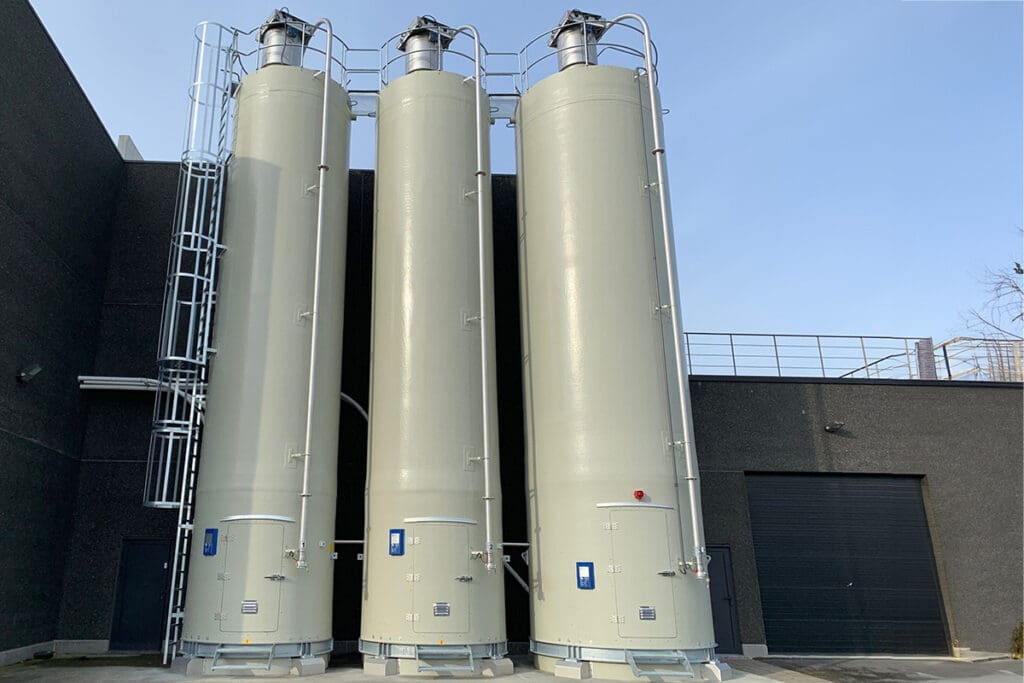
For various industries, such as the food industry, the agricultural sector, and the chemical industry, silos and tanks are essential components. With advancements in technologies, composite silos and tanks have emerged as a viable option.
Composite silos and tanks offer a high level of food safety. They are made of materials that do not corrode, oxidize, or react with food, thus preserving the integrity and quality of the stored food.
Silo’s and tanks made of composite are easy to clean and maintain. The smooth surface minimizes the retention of food residues, bacteria, and moulds, thereby reducing the risk of contamination significantly. The hygienic design and smooth interior wall ensure the important principle of first-in-first-out in silos.
Composite silos and tanks offer superior insulation properties compared to metal silos and tanks. Composite naturally has low thermal conductivity, ensuring that the contents are protected against temperature variations. This allows for excellent control over the temperature of the stored product.
This is particularly important for preserving freshness, flow properties, and the overall quality of the products. Composite reduces the risk of heat transfer and condensation, resulting in a better storage environment.
For even better insulation properties, composite silos and tanks can be fully insulated with a high-quality sandwich construction without cold bridges. This is done at our production facility so that the silo or tank is ready for immediate use after installation.
Composite silos and tanks offer great design freedom, allowing them to be easily customized to meet specific customer requirements while retaining their original product properties. They can take on various sizes, and configurations, making them suitable for a variety of storage needs.
Composite silos are fully compliant for products requiring an ATEX application up to a reduced explosion pressure of 1 bar, which is advantageous for the required relief area. The color can also be important. Since all RAL colours are available, the silo or tank can be matched to the corporate identity if desired.
Composite silos and tanks are resistant to corrosion, wear, weather conditions, and chemical exposure. They have a long lifespan and require minimal maintenance investment compared to traditional silos and tanks.
Composite silos and tanks are finished with a UV-resistant coating, which prevents weathering and maintains quality for decades. This not only reduces long-term maintenance costs but also ensures that stored materials are not exposed to contaminants or harmful substances.
Another advantage of composite silos and tanks is their low weight compared to metal silos. Composite materials offer an excellent strength-to-weight ratio. This makes the transportation and installation of composite silos considerably easier and more cost-effective than with metal silos. The lower weight requires less heavy foundations, reducing construction costs and shortening installation time.
Composite silos absorb sound and vibrations, making them ideal for
installation in environments where sound restrictions apply, such as urban areas.
Composite silos and tanks are made from recyclable materials and have a lower CO2 footprint than traditional metal silos. They contribute to a more sustainable food production and reduce the impact on the environment.
Composite silos and tanks provide long-term cost savings through reduced maintenance, lower energy costs, and their long lifespan contributes to lower total cost of ownership.
Storage of raw materials: Composite silos can be utilized for storing raw materials such as grains, flour, sugar, rice, salt, glucose, and other products. Composite materials are resistant to corrosion and have a smooth surface, making them suitable for storing raw materials used in food production without risk of contamination or quality loss.
The use of composite silos and tanks in the food industry offers many benefits such as durability, hygiene, chemical resistance, temperature control, and design flexibility. Composite as a material for storage systems meets the regulations of the food industry, thus providing the perfect solution for the specific requirements of this sector.
Polem products are fully TÜV and Eurofins certified according to EG 1935/2004 and the resulting regulation EU 10/2011 regarding materials and articles intended to come into contact with food.
More information